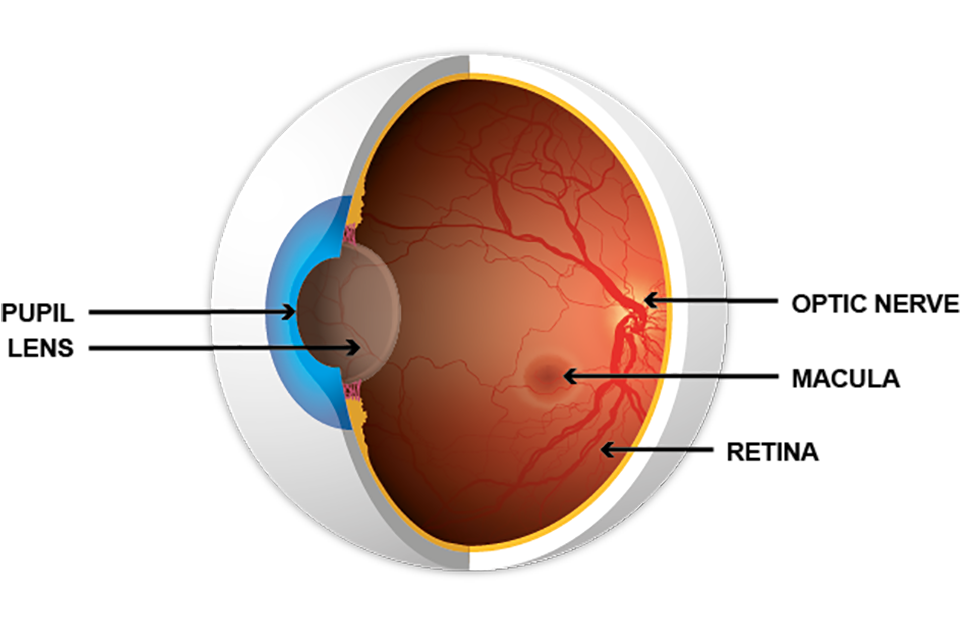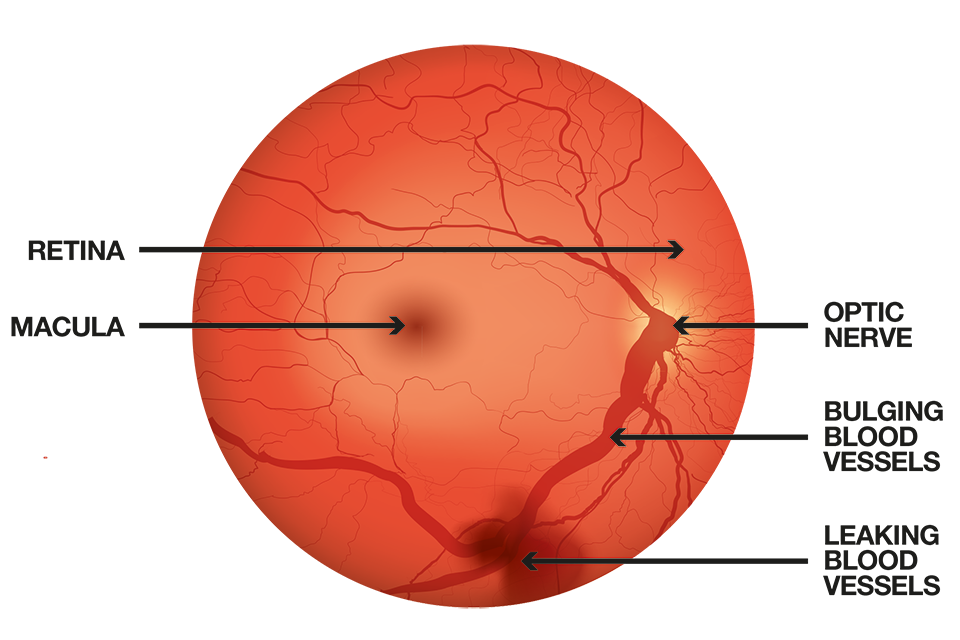Your guide to diabetic retinopathy
Updated 23 June 2025
Applies to England
1. Overview
This information is for people who have background retinopathy detected by diabetic eye screening.
It contains important information about signs of changes to your eyes caused by diabetes.
It explains:
- what changes have occurred in your eyes
- how your condition may progress over time
- what you can do to reduce the risk of more serious changes
You may want to discuss this information with your health care team.
2. Diabetic retinopathy

Cross-section of a healthy eye, showing pupil, lens, optic nerve, macula and retina
Diabetic retinopathy is damage to the retina, the part of the back of the eye that converts light into electrical signals. Your brain interprets these signals to produce the images that you see.
Blood vessels bring oxygen and nutrients to your retina. Having diabetes may affect these blood vessels in a number of ways, particularly if it is poorly controlled. If the changes are severe they will affect the health of your retina and can damage your sight.
Untreated diabetic retinopathy is one of the most common causes of sight loss. You are at risk of getting diabetic retinopathy whether your diabetes is controlled by diet, tablets or insulin.
3. Risk factors
You are at greater risk of diabetic retinopathy if you:
- have had diabetes for a long time
- have poorly controlled diabetes
- have high blood pressure
- are pregnant
- are of Asian or Afro-Caribbean ethnic background
Looking after your diabetes can reduce the risk of your retinopathy progressing and can slow the rate at which any changes happen.
Attending your regular diabetic eye screening appointments is important because diabetic retinopathy does not cause symptoms until it has reached an advanced stage. Treatment, when given at the right time, is effective at reducing or preventing damage to your sight.
4. How you can help
You can reduce the risk of your retinopathy getting worse if you:
- continue to attend your diabetic eye screening appointments when invited
- keep your blood sugar (HbA1c) at the levels agreed with your health care team
- see your health care team regularly to check your blood pressure is not raised
- keep your blood fats (cholesterol) at the levels agreed with your health care team
- get professional advice if you notice any new problems with your sight
- eat a healthy, balanced diet
- lose excess weight if you are overweight
- take your medication as prescribed
- exercise regularly
- cut down or stop smoking if you are a smoker
Remember, you should continue to visit an optician regularly for your normal eye examinations as well as attending your diabetic eye screening appointments.
5. Background retinopathy
Background retinopathy is the earliest stage of changes to your retina caused by diabetes. Background retinopathy is common.
At this stage, diabetes has started to affect the small blood vessels in your retina. This means they may:
- bulge slightly (microaneurysms)
- leak blood (retinal haemorrhages)
- leak fluid (exudates)
Background retinopathy does not affect your sight but means there is a greater risk that you will develop more serious changes that may damage your sight.
6. More advanced stages
6.1 Pre-proliferative retinopathy
Pre-proliferative retinopathy occurs when changes to the retina are more extensive than with background retinopathy. This means you may need to be monitored more closely because of the increased risk of developing changes that may damage your sight.
6.2 Proliferative retinopathy

A digital photograph of a retina showing signs of damage from diabetic retinopathy
Proliferative retinopathy is more serious and can cause loss of sight. It occurs if your retinopathy progresses further and large areas of your retina are starved of a proper blood supply.
Treatment for proliferative retinopathy reduces the risk of sight loss, particularly if given before your vision has been affected.
6.3 Maculopathy
The macula is the small central part of the retina that you use to see things clearly. It is the most used area of the retina and is the part you are using now to read this leaflet.
Maculopathy is when diabetic retinopathy occurs at or around your macula. If you have maculopathy, you may need to be monitored more closely or offered treatment to reduce the risk of sight loss.
7. More information
You can find more information at:
The NHS screening programmes use personal information from your NHS records to invite you for screening at the right time. NHS England also uses your information to ensure you receive high quality care and to improve the screening programmes. Find out more about how your information is used and protected, and your options.
Find out how to opt out of screening.
